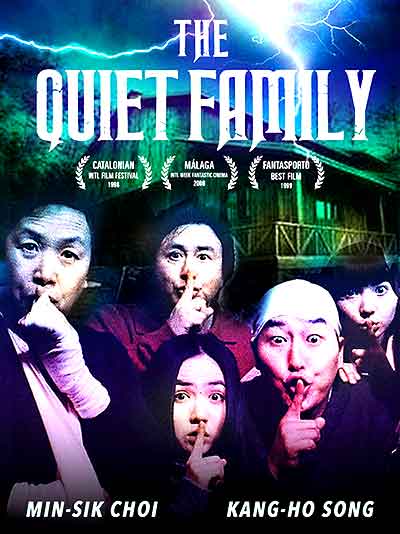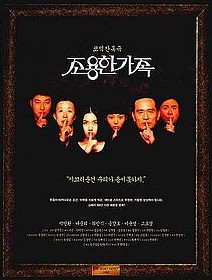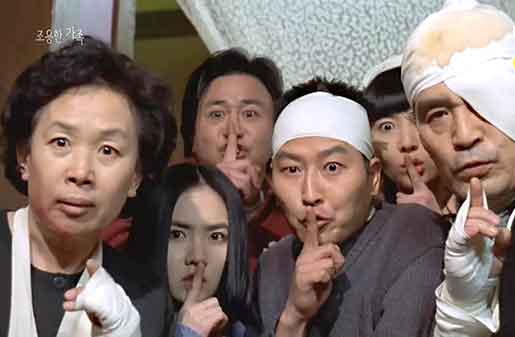 Pitch-dark comedy horror from South Korea about a family who can’t seem to keep from killing the guests of their rural lodge. The film doesn’t quite live up to its outsized reputation, but is still worth a look.
Pitch-dark comedy horror from South Korea about a family who can’t seem to keep from killing the guests of their rural lodge. The film doesn’t quite live up to its outsized reputation, but is still worth a look.
…still worth a look.
1998’s THE QUIET FAMILY (CHOYONGHAN KAJOK) was the debut of director Kim Jee-woon, who’d go on to become one of South Korea’s top filmmakers with THE FOUL KING, A TALE OF TWO SISTERS, THE GOOD, THE BAD, THE WEIRD and I SAW THE DEVIL. THE QUIET FAMILY was a cult hit in its native land, but in the rest of the world is probably best known as the inspiration for Takashi Miike’s Japanese comedy-musical THE HAPPINESS OF THE KATAKURIS.
A suburban family moves to the country and purchases the Misty Lodge, which they refurbish as a bed and breakfast. The problem is nobody initially stops by due to the fact that the road leading to the lodge isn’t completely paved. But then, to the family’s great surprise and delight, they get a guest: a severely depressed man who says very little and offers a crappy tip. He stays in room 208, which the family’s youngest daughter Mina believes to be haunted. That supposition would appear to be confirmed when the man is found dead the following morning, having apparently committed suicide.
This may have been Kim Jee-woon’s first film, but it’s as assured as any of his subsequent efforts, being slickly lensed, well paced and atmospheric.
The family elects to surreptitiously bury the corpse rather than report the death, and that same night a young couple checks into the lodge. The couple seem every bit as depressed as the former lodger, and they turn up dead the following morning—or so it seems, at least: just as the family is about to bury the bodies one of them unexpectedly springs back to life, inspiring the father to commit murder via a shovel to the head.
More guests turn up at the lodge, including a horny young couple who also stay in room 208. They don’t commit suicide, but do find the wallet that belonged to the room’s first tenant. Two of the family members harass the couple in the belief that they may have uncovered evidence about a possible murder, but the harassment comes to nothing.
The next inhabitant of room 208, a randy young man, meets his death after attempting to rape Mina. Several more killings follow, along with new problems in the form of a construction company digging near the lodge and some North Korean spies loose in the area. Will our “quiet family” be able to overcome these obstacles and find contentment?
 This may have been Kim Jee-woon’s first film, but it’s as assured as any of his subsequent efforts, being slickly lensed, well paced and atmospheric. Equally important is the overpowering strain of dark comedy, which is well delineated (though never exactly laugh-out-loud funny) without ever compromising the film’s darker edges. The seventies-era American rock tunes that pepper the soundtrack are odd choices (including, for some reason, “I Think I Love You” by the Partridge Family), but curiously edifying nonetheless.
This may have been Kim Jee-woon’s first film, but it’s as assured as any of his subsequent efforts, being slickly lensed, well paced and atmospheric. Equally important is the overpowering strain of dark comedy, which is well delineated (though never exactly laugh-out-loud funny) without ever compromising the film’s darker edges. The seventies-era American rock tunes that pepper the soundtrack are odd choices (including, for some reason, “I Think I Love You” by the Partridge Family), but curiously edifying nonetheless.
The seventies-era American rock tunes that pepper the soundtrack are odd choices (including, for some reason, “I Think I Love You” by the Partridge Family), but curiously edifying nonetheless.
Mind you, this doesn’t mean the film is entirely successful. It suffers from a rather lax and unfocused middle act that’s all the more noticeable because the first act is quite riveting, as are the startlingly gory climax and hauntingly understated final scenes.
The characterizations could be a bit stronger, with none of the members of the titular family ever registering as distinct individuals. Furthermore, the repetitive nature of the film is wearying, recycling as it does the same plot point over and over: the family confronts new tenants who invariably provoke their own deaths through obnoxious behavior. Left unexplored are the dark currents that drive the family to such extreme behavior, and also the supernatural overtones that are quite evident yet never explained, or even remarked upon.
Vital Statistics
THE QUIET FAMILY (CHOYONGHAN KAJOK)
Myung Film Company Ltd.
Director: Kim Jee-woon
Producers: Lee Eun, Lee Mi-yeon
Screenplay: Kim Jee-woon
Cinematography: Jeong Kwang-Seok
Cast: Choi Min-sik, Song Kang-ho, Park In-hwan, Na Mun-hee, Go Ho-kyung, Lee Yen-seong, Choi Cheol-ho, Gi Ju-bong, Jang Ka-hyeon, Jeong Jae-yeong, Jeong Woong-in, Ji Su-Won, Lee Gi-yeong

